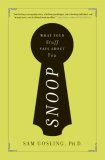October 9, 2008
 My first book review on Metapsychology Online Reviews appeared this week, a review of Snoop: What Your Stuff Says About You by Sam Gosling. To supplement the review I’m posting here links to some of the sites and books mentioned in Snoop or related to the book.
My first book review on Metapsychology Online Reviews appeared this week, a review of Snoop: What Your Stuff Says About You by Sam Gosling. To supplement the review I’m posting here links to some of the sites and books mentioned in Snoop or related to the book.
The website for the book has a links page so I won’t duplicate any of those links.
The Characters of Theophrastus, early Greek personality study.
Sanjay Srinivastava’s website is cited in the Notes “for a good brief introduction to the Big Five” p. 234).
Dan P. McAdams, “What do we know when we know a person?” (link to abstract)
books by Dan P. McAdams

Gait Recognition research at Georgia Institute of Technology
The Rachel Papers by Martin Amis, fiction about personality faking.

A recent VSL: Science item on Facebook narcissism is very much in the spirit of Snoop
Comments (0)
- psychology,self
July 25, 2008
By chance I’ve just read two novels that deal with issues of identity, coming from opposite directions: 
 Atmospheric Disturbances: A Novel by Rivka Galchen and The Soul Thief: A Novel by Charles Baxter.
Atmospheric Disturbances: A Novel by Rivka Galchen and The Soul Thief: A Novel by Charles Baxter.
In Atmospheric Disturbances, a first novel written by a younger woman, the narrator is an older man, a psychiatrist, who believes his wife has been replaced by an impostor. In The Soul Thief, the author’s fourth novel, the narrator is a graduate student who suspects another character is stealing or trying to steal his identity.
How much change or discontinuity can the concept of identity accommodate? What if the people you know suddenly don’t recognize you? What if the past you thought was yours is told to you as someone else’s story?
Charles Baxter on “questions of identity”
‘Atmospheric Disturbances’ website
Comments (0)
- fiction,self
July 4, 2008
Describing Ourselves: Wittgenstein and Autobiographical Consciousness by Garry Hagberg (Oxford University Press, 2008) (in stock at Amazon UK, coming July 15 in the US)
Product description:
The voluminous writings of Ludwig Wittgenstein contain some of the most profound reflections of recent times on the nature of the human subject and self-understanding – the human condition, philosophically speaking. Describing Ourselves mines those extensive writings for a conception of the self that stands in striking contrast to its predecessors as well as its more recent alternatives. More specifically, the book offers a detailed discussion of Wittgenstein’s later writings on language and mind as they hold special significance for the understanding and clarification of the distinctive character of self-descriptive or autobiographical language.
Garry L. Hagberg undertakes a ground-breaking philosophical investigation of selected autobiographical writings – among the best examples we have of human selves exploring themselves – as they cast new and special light on the critique of mind-body dualism and its undercurrents in particular and on the nature of autobiographical consciousness more generally. The chapters take up in turn the topics of self-consciousness, what Wittgenstein calls ‘the inner picture’, mental privacy and the picture of metaphysical seclusion, the very idea of our observation of the contents of consciousness, first-person expressive speech, reflexive or self-directed thought and competing pictures of introspection, the nuances of retrospective self-understanding, person-perception and the corollary issues of self-perception (itself an interestingly dangerous phrase), self-defining memory, and the therapeutic conception of philosophical progress as it applies to all of these issues.
The cast of characters interwoven throughout this rich discussion include, in addition to Wittgenstein centrally, Augustine, Goethe, Dostoevsky, Kierkegaard, Iris Murdoch, Donald Davidson, and Stanley Cavell, among others. Throughout, conceptual clarifications concerning mind and language are put to work in the investigation of issues relating to self-description and in novel philosophical readings of autobiographical texts.
Comments (0)
- new books,self
June 30, 2008
Epistemic Dimensions of Personhood by Simon Evnine (Oxford University Press, 2008)
Product description:
Simon Evnine examines various epistemic aspects of what it is to be a person. Persons are defined as finite beings that have beliefs, including second-order beliefs about their own and others’ beliefs, and are agents, capable of making long-term plans. It is argued that for any being meeting these conditions, a number of epistemic consequences obtain. First, all such beings must have certain logical concepts and be able to use them in certain ways. Secondly, there are at least two principles governing belief that it is rational for persons to satisfy and are such that nothing can be a person at all unless it satisfies them to a large extent. These principles are that one believe the conjunction of one’s beliefs and that one treat one’s future beliefs as, by and large, better than one’s current beliefs. Thirdly, persons both occupy epistemic points of view on the world and show up within those views. This makes it impossible for them to be completely objective about their own beliefs. Ideals of rationality that require such objectivity, while not necessarily wrong, are intrinsically problematic for persons. This “aspectual dualism” is characteristic of treatments of persons in the Kantian tradition. In sum, these epistemic consequences support a traditional view of the nature of persons, one in opposition to much recent theorizing.
Comments (0)
- new books,philosophy of mind,self
June 3, 2008
Sciousness  by Jonathan Bricklin explores nondual aspects of William James’s thought, especially his notion of “sciousness.”
by Jonathan Bricklin explores nondual aspects of William James’s thought, especially his notion of “sciousness.”
More of a review coming soon, but here is an excerpt from Bricklin’s essay (p. 71):
The reverberation of striving for and against, of welcoming and opposing, that generates the sense of self, defines a range within which all emotions arise. Every emotion is found somewhere between them. To focus, however, as James does, exclusively on the movement between the polar opposites of welcoming and opposing is to lose sight of a more fundamental movement between a neutral state of consciousness and all others — that is, the movement between sciousness and con-sciousness. To describe the feeling of self without reference to sciousness is like describing sound without silence — the silence that forms the contour of any sound that is heard. Just as there can be no sense of sound without a sense of silence, there can be no sense of self without a non-self background to give it definition. “The palpitating inward life” of welcoming and opposing cannot itself give rise to self-feeling any more than the change from soft to loud gives rise to sound. As sound is defined by its contrast to silence, so, too, the “reverberation” (second beat) of “I” is defined by its contrast to a first beat non-“I.”
Comments (3)
- consciousness,self
 My first book review on Metapsychology Online Reviews appeared this week, a review of Snoop: What Your Stuff Says About You by Sam Gosling. To supplement the review I’m posting here links to some of the sites and books mentioned in Snoop or related to the book.
My first book review on Metapsychology Online Reviews appeared this week, a review of Snoop: What Your Stuff Says About You by Sam Gosling. To supplement the review I’m posting here links to some of the sites and books mentioned in Snoop or related to the book.







